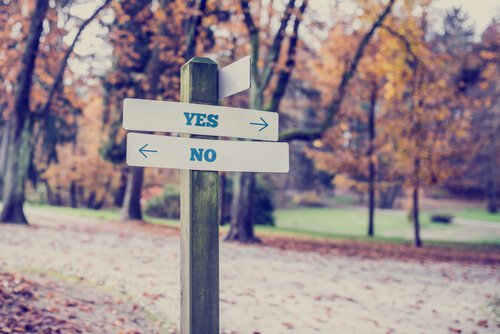When You Say No to Others, You Say Yes to Yourself


Reviewed and approved by the psychologist Sergio De Dios González
Are you tired of being diplomatic and conciliatory? Of always putting other people’s needs and priorities before your own? Have you ever thought about the fact that if you were sincere and direct about your feelings with the other person that there would be no need to raise your voice or get angry, and you would feel better?
Are you tired of fixing your neighbors computer, of always being the one to take care of your nephews, or the one who always goes to the doctor with your aunt and who is always overloaded with other people’s engagements and appointments, even when you don’t feel like doing it, forgetting about fulfilling your own needs in the process?
Are you tired of dancing to every one else’s beat?

Saying “no” or “enough” or “you’re doing that incorrectly” can free us, comfort us, and make us feel better about ourselves.
That’s why when we start doing little things or using small gestures to show our discomfort or irritation, and people say things like “you didn’t used to be this way” or “you’ve changed a lot!,” you should answer: “Yes, I have changed” and be happy about it.
Surely, these changes will start to make a difference in your sense of your self. You’ll feel more respected, more sure of yourself, and learn to get along with people in a more positive and honest manner; and if someone stops loving you, then they never really did.
We have to demand others’ respect and demand the same for ourselves, and that’s not done through raising your voice or making more noise. Everyone will notice the change in your attitude when you begin to be honest and direct with the people around you.
Backing down all the time and always saying “yes” doesn’t buy you more love. In fact, when you develop that mentality, there’s usually low self esteem hiding behind it.
How can we learn to say “No”?
1. Start with the little things. Don’t give silly excuses; people will notice. Simply say it doesn’t appeal to you, that you’re tired, that you understand but you’re not willing, and that you have responsibilities of your own.
2. If you’re not sure about how you’re going to do it, think and prepare beforehand. Stand in front of the mirror and pay attention to your body language as much as your verbal language. Reassure yourself that your argument is sensible and reasonable.
3. Don’t be afraid. It’s normal to feel uncomfortable and anxious when it comes time to say “no,” but it’s been said that “charity begins with yourself.”

4. Lose the fear of other people’s opinions. The most important approval you can receive is from yourself.
5. There’s no need to over-explain yourself. It makes you appear insecure and unsure of your statements.
6. Learn that if a person truly loves and appreciates you, they won’t stop doing it because you say “no” to something. You have the right to rest and take care of yourself first. Be aware of your self-esteem.
7. Learn to not feel guilty about saying “No.” That’s an internal job you have that’s to be improved little by little.
Are you tired of being diplomatic and conciliatory? Of always putting other people’s needs and priorities before your own? Have you ever thought about the fact that if you were sincere and direct about your feelings with the other person that there would be no need to raise your voice or get angry, and you would feel better?
Are you tired of fixing your neighbors computer, of always being the one to take care of your nephews, or the one who always goes to the doctor with your aunt and who is always overloaded with other people’s engagements and appointments, even when you don’t feel like doing it, forgetting about fulfilling your own needs in the process?
Are you tired of dancing to every one else’s beat?

Saying “no” or “enough” or “you’re doing that incorrectly” can free us, comfort us, and make us feel better about ourselves.
That’s why when we start doing little things or using small gestures to show our discomfort or irritation, and people say things like “you didn’t used to be this way” or “you’ve changed a lot!,” you should answer: “Yes, I have changed” and be happy about it.
Surely, these changes will start to make a difference in your sense of your self. You’ll feel more respected, more sure of yourself, and learn to get along with people in a more positive and honest manner; and if someone stops loving you, then they never really did.
We have to demand others’ respect and demand the same for ourselves, and that’s not done through raising your voice or making more noise. Everyone will notice the change in your attitude when you begin to be honest and direct with the people around you.
Backing down all the time and always saying “yes” doesn’t buy you more love. In fact, when you develop that mentality, there’s usually low self esteem hiding behind it.
How can we learn to say “No”?
1. Start with the little things. Don’t give silly excuses; people will notice. Simply say it doesn’t appeal to you, that you’re tired, that you understand but you’re not willing, and that you have responsibilities of your own.
2. If you’re not sure about how you’re going to do it, think and prepare beforehand. Stand in front of the mirror and pay attention to your body language as much as your verbal language. Reassure yourself that your argument is sensible and reasonable.
3. Don’t be afraid. It’s normal to feel uncomfortable and anxious when it comes time to say “no,” but it’s been said that “charity begins with yourself.”

4. Lose the fear of other people’s opinions. The most important approval you can receive is from yourself.
5. There’s no need to over-explain yourself. It makes you appear insecure and unsure of your statements.
6. Learn that if a person truly loves and appreciates you, they won’t stop doing it because you say “no” to something. You have the right to rest and take care of yourself first. Be aware of your self-esteem.
7. Learn to not feel guilty about saying “No.” That’s an internal job you have that’s to be improved little by little.
This text is provided for informational purposes only and does not replace consultation with a professional. If in doubt, consult your specialist.







